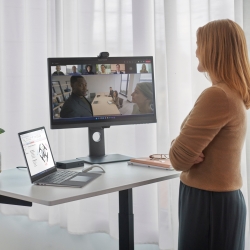April 14, 2022
Office costs creep up, but not because of higher rents
 Higher fit-out costs and service charge growth, not rent rises are set to increase office occupier costs in 2022, claims a new report. Savills analysis of Q1 22 Prime Office Costs (SPOC) in global markets around the world has shown that higher fit-out costs, reflecting material and labour cost inflation, are beginning to creep through in some office markets. While overall there has been no movement in the position of cities in the rankings since the end of 2021, says Savills, some markets are experiencing rising costs in fitting out space and increased service charges. According to Savills this trend is most evident in Chinese cities, Kuala Lumpur, and in North American cities at the moment, but other markets across the globe are set to follow suit in the coming quarters.
Higher fit-out costs and service charge growth, not rent rises are set to increase office occupier costs in 2022, claims a new report. Savills analysis of Q1 22 Prime Office Costs (SPOC) in global markets around the world has shown that higher fit-out costs, reflecting material and labour cost inflation, are beginning to creep through in some office markets. While overall there has been no movement in the position of cities in the rankings since the end of 2021, says Savills, some markets are experiencing rising costs in fitting out space and increased service charges. According to Savills this trend is most evident in Chinese cities, Kuala Lumpur, and in North American cities at the moment, but other markets across the globe are set to follow suit in the coming quarters.
Jeremy Bates, head of EMEA occupational markets at Savills, comments: “From higher prices for raw materials to increasing labour costs to keep up with rising inflation, it’s likely that most office occupiers will have to pay more to rent and fit-out their space in global cities this year.
“Whilst rent is the usual indicator of increasing cost, service charge rises and higher capital expenditure will represent the largest contributions towards increased occupier costs in the coming quarters. Even in markets where landlords tend to pay for fit-outs, these costs will eventually be passed on to occupiers later in the form of higher rents. Nonetheless, for many office occupiers the expense is unlikely to deter them from selecting top quality spaces in prime central business districts to attract and retain talent, although they are carrying out extensive data gathering exercises on how employees are using space before making decisions on exactly how much to take.”
Savills says that overall headline rents have, on average, remained flat in local currencies and the increasing additional costs have yet to appear across many markets, according to the international real estate advisor, with fluctuating exchange rates due to increased uncertainty producing the appearance of declining costs for many markets in Dollar terms during the first quarter of 2022, while in local currencies they have broadly remained consistent with Q4 2021.












 The last 18 months have seen unprecedented change. Covid-19 has forced people to re-evaluate every aspect of their lives, including their career. As a result, we’ve seen a surge in workers taking charge of their careers and leaving their jobs as part of the so-called Great Resignation. Recent data from the
The last 18 months have seen unprecedented change. Covid-19 has forced people to re-evaluate every aspect of their lives, including their career. As a result, we’ve seen a surge in workers taking charge of their careers and leaving their jobs as part of the so-called Great Resignation. Recent data from the 
 The UK’s workforce is undergoing rapid transformation as employees’ expectations and motivations radically change. The impact of Brexit, COVID-19 and long periods of furlough have created a tidal wave of resignations across every industry. Workers are re-thinking career paths, work conditions and long-term goals after a turbulent 18 months; with one study finding that
The UK’s workforce is undergoing rapid transformation as employees’ expectations and motivations radically change. The impact of Brexit, COVID-19 and long periods of furlough have created a tidal wave of resignations across every industry. Workers are re-thinking career paths, work conditions and long-term goals after a turbulent 18 months; with one study finding that 
 The
The 
 Many governments are increasingly approaching artificial intelligence with an almost religious zeal. By 2018 at least
Many governments are increasingly approaching artificial intelligence with an almost religious zeal. By 2018 at least 


 Over the past ten years, reuse of furniture and furnishings has been extremely limited. Most redundant assets have been discarded to landfill. It’s a brutal fact that it is the easy and less expensive option. Many products sent for recycling often end up in landfill or incineration and so still contributing to carbon emissions. As offices plan for
Over the past ten years, reuse of furniture and furnishings has been extremely limited. Most redundant assets have been discarded to landfill. It’s a brutal fact that it is the easy and less expensive option. Many products sent for recycling often end up in landfill or incineration and so still contributing to carbon emissions. As offices plan for 


 Has working at home during lockdown made people
Has working at home during lockdown made people 








March 11, 2022
The much talked about new normal doesn’t exist, but the world has changed in profound ways
by Dr Simon Williams • Cities, Comment, Flexible working, Property, Technology
Work
One of the biggest changes predicted during the pandemic was a long-term shift towards home or hybrid working. However, there are already signs that this transition might not be as obvious or complete as expected.
[perfectpullquote align=”right” bordertop=”false” cite=”” link=”” color=”” class=”” size=””]The signs of the transition to hybrid work are not as obvious or complete as expected[/perfectpullquote]
In the UK, the proportion of people working from home at least some of the time increased from 27 percent in 2019 to 37 percent in 2020, before falling to 30 percent in January 2022. Similarly, in the US the proportion working from home declined from 35 percent in May 2020 to 11 percent in December 2021.
One of the main reasons people are going back to the office is employers’ expectations. Many companies are concerned that more permanent home working might affect employees’ team building, creativity and productivity.
But among employees, there’s a greater appetite for hybrid and flexible working. One recent multi-national survey found that whereas roughly one-third of workers had worked at home at least some of the time before the pandemic, roughly half said they want to in the future.
Shopping
The pandemic didn’t create the habit of online shopping, but it makes more of us do it. Did this make us realise we don’t need actual stores anymore?
It doesn’t seem so. Shopping in bricks-and-mortar stores has already started to recover. Recent data on people’s movements, gathered anonymously from mobile devices, shows how in many countries, before omicron hit, travel to retail and recreation spaces was back up to pre-pandemic levels, and is already starting to rebound after omicron.
The rise in online sales has also not been as dramatic or sustained as many predicted. In the UK, online sales made up 20 percent of total retail sales before the pandemic. By February 2021 this had risen to 36 percent, before declining steadily to 25 percent in February 2022.
Travel
One habit that might take longer to recover is our pre-pandemic love of international travel. It has taken a hit around the world, and the sector is still struggling. The UN’s International Civil Aviation Organization projects that international travel in 2022 will still be down by nearly a half compared to 2019.
One British survey conducted last September found that while 80 percent of people were planning on holidaying in the UK in the next year, only around 40 percent were considering going abroad. In comparison, in the 12 months up to July 2019, 64 percent of Brits travelled abroad for a holiday according to one travel industry body.
People’s reluctance to travel has been largely down to concerns over the virus and confusion over travel rules. As worries decline and rules get lifted, we may see a “mini-boom” in holidaymaking.
Socialising
Early in the pandemic, some commentators – including the US chief medical adviser Dr Anthony Fauci – suggested we might never return to shaking hands. I, with my colleague Dr Kimberly Dienes, argued that it was vital these rituals make a comeback, as they have several social, psychological and even biological benefits.
Are social-distancing habits, including meeting fewer people and having less physical contact with those we do, here to stay? For most people, no. Data shows only one-third of people in the UK are still socially distancing regularly, the lowest proportion since the pandemic began.
No new normal
But truly, only time will tell how much the pandemic will have changed our habits. However, bolder predictions – that the pandemic was going to completely and irrevocably change our ways of working, shopping, travelling and socialising – now seem premature and exaggerated. The pandemic has taught us we can work, learn, shop and socialise in different ways, but the question now is whether we still want to.
[perfectpullquote align=”right” bordertop=”false” cite=”” link=”” color=”” class=”” size=””]The pandemic has taught us that we need to connect with others[/perfectpullquote]
Humans have basic needs, such as autonomy, feeling related to others, and feeling effective and competent in what we do. Part of the challenge with home working, for example, is that it simultaneously fulfils one need by giving us greater autonomy but takes away another by making us less connected. Expanding adequately supported, equality-focused, hybrid and flexible working arrangements is perhaps a promising way to meet both needs.
Some people will have acquired a sense of competence, or at least familiarity, with the new ways of doing things during the pandemic and so may wish to keep doing them. In some areas – travelling overseas, for example – it may take longer for our competence, and confidence, in old habits to return. However, many seem to be quite quickly returning to old ways and re-learning how to feel competent at doing things that they did before.
The extent to which we’ll go back to our old ways may also depend on our personality traits, which have been shown to shape our compliance with new behaviour. For example, those more open to new experiences by nature, or more extroverted, may be more eager to travel internationally or socialise in larger groups.
Finally, the pandemic may have served as a reminder of how much we appreciate everyday interactions with others, in shops, restaurants and so on. People may be keen to return to familiar ways that revive this – for example, picking something up in a store on the way home from work. Above all, the pandemic has taught us that we need to connect with others and that there are limits as to how much online communication can replace real, face-to-face interactions.
This article is republished from The Conversation under a Creative Commons license. Read the original article.